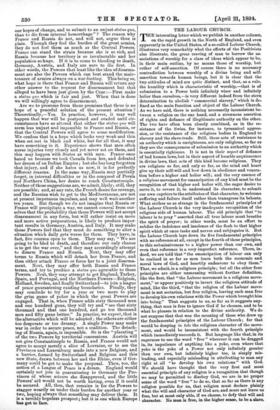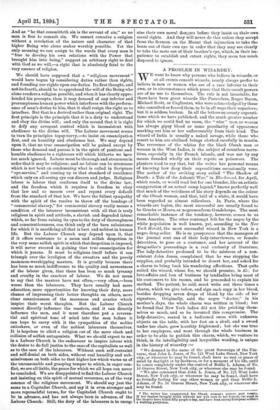THE LABOUR CHURCH.
THE interesting letter which we publish in another column, on the rapid growth in the North of England, and even apparently in the United States, of a so-called Labour Church, illustrates very remarkably what the efforts of the Positivists also illustrate, the great craving of man to borrow the as- sociations of worship for a class of ideas which appear to be, in their main outline, by no means those of worship, but rather of self-assertion. Of course there is no necessary contradiction between worship of a divine being and self- assertion towards human beings, but it is clear that the two attitudes of mind are quite distinct, and that, as a rule, the humility which is characteristic of worship,—that is of submission to a Power both infinitely wiser and infinitely holier than ourselves,—is very different indeed from the stern determination to abolish "commercial slavery," which is de- fined as the main function and object of the Labour Church. As we have said, there is nothing necessarily inconsistent be- tween a religion on the one hand, and a strenuous assertion of rights and defiance of illegitimate authority on the other. The two have often been closely combined, as in the re- sistance of the Swiss, for instance, to tyrannical aggres- sion, or the resistance of the religious bodies in England to slavery and the slave-trade. Still, these acts of resistance to an authority which is unrighteous, are only religious, so far as they are the consequences of submission to an authority which is essentially righteous. It is not in their aspect of defiance of bad human laws, but in their aspect of humble acquiescence in divine laws, that acts of this kind become religious. They are religious so far, and only so far, as the mind and heart give up their self-will and bow down in obedience and venera- tion before a higher and holier will; and the very essence of a religious movement for emancipation of any kind must be the recognition of that higher and holier will, the eager desire to serve it, to revere it, to understand its character, to submit our own caprices to the attributes of that character, to welcome suffering and failure itself rather than transgress its behests. What strikes us as strange in the fundamental principles of the Labour Church is the very inadequate recognition of the religious side of human labour. The old principle that "to labour is to pray" asserted that all true labour must breathe the spirit of prayer; in other words, must be an effort to subdue the indolence and insolence of the flesh to that higher spirit which at once tasks and nerves and subjugates it. But the Labour Church lays down its five fundamental principles with no reference at all, except in the fourth of these principles, to this submissiveness to a higher power than our own, and even that reference is a very imperfect reference. There, in- deed, we are told that "the emancipation of labour can only be realised in so far as men learn both the economic and moral laws of God, and heartily endeavour to obey them." That, we admit, is a religious principle; but all the other four principles are either unmeaning without further definition, like the first, that "the Labour movement is a religious move- ment," or appear positively to invert the religious attitude of mind, like the third, "that the religion of the Labopr move- ment is not sectarian, but free religion, leaving each man free to develop his own relations with the Power which brought him into being." That suggests to us, so far as it suggests any- thing, that man is free to ignore God if he chooses, and to be what he pleases in relation to the divine authority. We do not suppose that that was the meaning of those who drew up the fundamental principles of the Labour Church; for that would be denying in toto the religious character of the move- ment, and would be inconsistent with the fourth principle which immediately succeeds it. But language like that, in its eagerness to use the word " free " wherever it can be dragged in, its impatience of anything like a yoke, even where that yoke is the yoke of a Power not only infinitely greater than our own, but infinitely higher too, is simply mis- leading, and especially misleading in attributing to man any right at all "to develop his own relations" with God. We should have thought that the very first and most essential principle of any religion is a recognition that though we may be permitted to disobey God, we are in no proper sense of the word " free " to do so, that so far as there is any religion possible for us, that religion must declare plainly what the will and character of God are, and must not leave us free, but at most only able, if we choose, to defy that will and character. No man is free, in the higher sense, to be a slave.
And as "he that committeth sin is the servant of sin," so no man is free to commit sin. We cannot conceive a religion without a revelation of the nature and character of that higher Being who alone makes worship possible. Yet the only meaning we can assign to the words that every man is "free to develop his own relations with the Power that brought him into being," suggest an arbitrary right to deal with God as we will,—a right that is absolutely fatal to the very essence of religion.
We should have supposed that a "religious movement" would have begun by considering duties rather than rights, and founding our rights upon our duties. Its first thought, and not its fourth, should be to apprehend the will of the Being who alone renders a religion possible, and when it has clearly appre- hended his precepts, then it may demand of any inferior and presumptuous human power which interferes with the perform- ance of man's duties to him, that it shall resign the right so to interfere. But that is a derived rather than original right. The first principle is the principle that it is a duty to understand and obey the divine will ; and only the second that it is right to deft any arrogant control which is inconsistent with obedience to the divine will. The Labour movement seems te turn its principles topsy-turvy,—to insist on emancipation first, and on humility and obedience last. We may depend upon it, that no true emancipation will be gained except by those who demand and pursue it in the spirit of penitent and humble obedience to a righteous will which hitherto we bs,ve too much ignored. Labour must be thorough and strenuous in order that it may be religious; and no labour can be strenuous which is not bent on condemning what is called in Scripture "eye-service," and coming up to that standard of excellence which only an all-seeing eye can discern and judge. Religious labour is labour that conforms itself to the divine law, and the freedom which it requires is freedom to obey that law and to mourn over and repent every default from the standard of that law. We have the fullest sympathy with the spirit of the resolve to throw off the bondage of "commercial slavery," for commercial slavery really means a condition of the labourer inconsistent with all that is truly religious in spirit and attitude, a slavish and degraded labour which, so far from raising its eyes to the duty of thoroughness and conscientiousness, can think only of the bare subsistence for which it is sacrificing all that is best and noblest in human life. But the Labour Church may depend upon it, that if it offers resistance to a mean and selfish despotism in the very same selfish spirit in which that despotism is imposed, it will never succeed in gaining that true emancipation for which it yearns. It must be religious itself before it can triumph over the irreligion of the sweaters and the purely mammon-worshipping masters. It is greatly because there has been so much indifference to the quality and earnestness of the labour given, that there has been so much tyranny and cruelty in the exacters of labour. We do not mean to say that the masters have not often,—very often,—been worse than the labourers. They have usually had more education, more opportunities for knowing their duty, more chance of impressing their better thoughts on others, more clear consciousness of the meanness and avarice which inspire their worst thoughts. But the Labour Church cannot directly influence the masters, and it can directly influence the men, and it must therefore put a reveren- tial and spiritual tone of mind into the men before it can hope to carry with it the sympathies of the nobler onlookers, or even of the noblest labourers themselves. It is hopeless to elicit a religion out of the mere clash and collision of selfish antagonists. What we should expect to see in a Labour Church is the endeavour to inspire labour with the desire to do full justice to the case of the capitalists as well as to the case of the labourers. Without such self-restraint and self-denial on both sides, without real humility and sub- missiveness on both sides to that higher law which warns us of the unreasonable and grasping temper to which, in eager con- flict, we are all liable, the peace for which we all hope can never be concluded. We are disappointed to find the Labour Church not insisting on this spirit of mutual reverence, as of the very essence of the religious movement. We should say just the same to a Capitalist Church, and say it in even stronger and more reproachful terms, for the Capitalist Church ought to be in advance, and has not always been in advance, of the Labour Church: Still, the duty of the labourers is to recog-
nise their own moral dangers before they insist on their own moral rights. And they will never do this unless they accept from the Sermon on the Mount that injunction to take the beam out of their own eye in order that they may see clearly to take the mote out of their brother's eye, which, in their im- patience to establish and extort rights, they seem too much disposed to ignore.



































 Previous page
Previous page